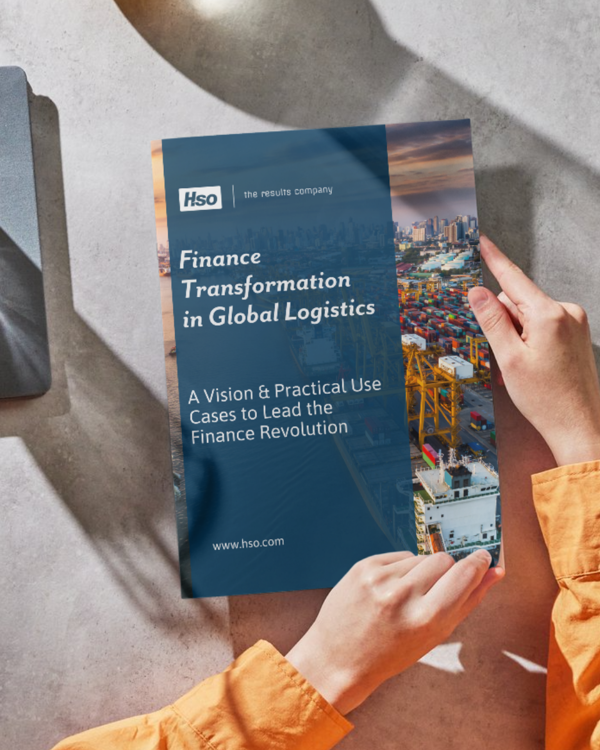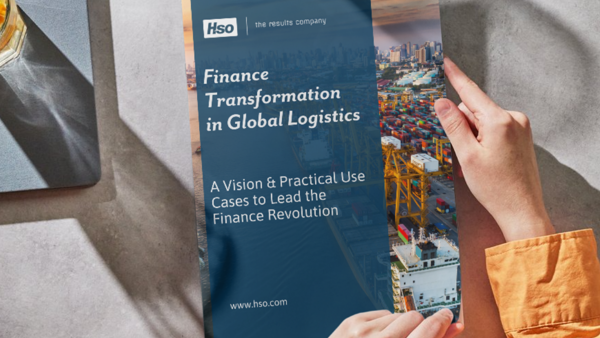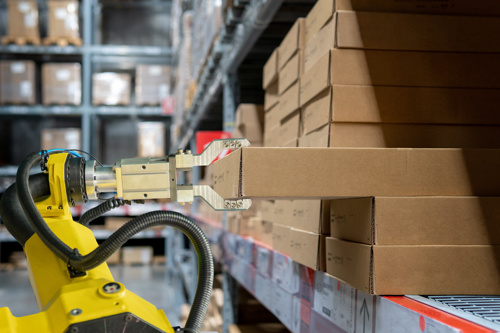Table of Contents
Modernize Finance, Cut Risks, and Unlock AI
Logistics finance leaders: book a free session to identify your finance bottlenecks, uncover ROI opportunities, and get tailored AI and automation recommendations.
Finance Transformation in Global Logistics:
Vision & Practical Use Cases to Lead the Finance Revolution

Executive Summary
Imagine a finance department at a global logistics provider that’s not bogged down by spreadsheets, manual reconciliations, or outdated software. It becomes the looking glass of the executive team, providing real-time insights across borders and leveraging data to navigate a volatile, low-margin industry.
This transformation is already underway, driven by game-changing platforms like Microsoft Dynamics 365 Finance & Operations, implemented with global operations in mind. And yet, many organizations are unsure of how they can break free from the inefficiencies of the past.
What's Inside?
This whitepaper explores how multinational logistic service providers (LSPs) can modernize their finance departments to meet the demands of:
With insights from industry research and real-world case studies, we outline a roadmap to modern finance—one that turns fragmented data into a single source of truth, and inefficiencies into competitive advantages.


Table of Contents
Shifting your Vision to the Future
2Practicum: Four Use Cases that Tackle Major Finance Bottlenecks
3Technologies: Tools for Transformation
4HSO's Approach to Modern Finance
5Client Case Study: Financial Advisory Firm
6A Look at the Future of Finance
See how advanced analytics tools like Fabric integrate near real-time data for better cash flow management, operational foresight, and more informed decision-making.
Discover how AI, agents, copilots and automated workflows reduce the stress and time required for financial closings, transforming them into streamlined, proactive processes.
Learn how AI ensures compliance across multiple jurisdictions by adapting financial data to both local and general GAAP standards, eliminating errors and manual effort.
Explore the role of AI-driven assistants that fetch data, provide recommendations, and facilitate seamless collaboration across departments.
With these transformative examples, we showcase how modern finance isn’t just an operational upgrade—it’s a strategic necessity global logistics firms navigating complexity, volatility, and growth. Let this be your guide to unlocking a smarter and more agile finance department.


Shifting Your Vision to the Future
The finance department has always been the fiscal lifeblood of logistics organizations—tracking costs, managing margins, and ensuring compliance across a web of operations.
But in today’s global logistics landscape, where volatility is the norm and FreightTech is reshaping the industry, finance leaders are expected to do more.
CFOs and finance leaders at multinational LSPs must now act as strategic advisors, helping their organizations:
From managing multi-entity operations and cross-border compliance to enabling faster billing cycles and real-time cost tracking, modern finance is no longer a support function—it’s a competitive differentiator.
A Tale of Two Finance Departments
Traditional Finance Department
In one global logistics firm, finance teams scramble to consolidate data from dozens of entities across regions for quarterly closings, working late into the night with manual processes and outdated software.
Freight costs are tracked in spreadsheets, compliance is a constant concern, and month-end closings are a stressful race against the clock.
Modern Finance Department
In another, teams use AI, Copilots, and autonomous agents to access near real-time insights across all business units.
They run predictive analytics on fuel costs, automate multi-GAAP reporting, and close books in record time. As a result, they’ve freed up resources to focus on strategic planning and margin optimization.
The difference? A commitment to modern finance tools, implemented with global operations in mind. For multinational logistics providers, the choice is clear: embrace transformation or risk falling behind in an industry where speed, accuracy, and agility are everything.
It’s a story of transformation—one that begins with reimagining what finance can achieve.
The Changing Role of CFOs
According to Gartner, “Data, metrics, and analytics emerged as the top CFO priority for 2025.” For CFOs at multinational logistic service providers, this shift is especially urgent. They’re no longer just risk managers or compliance overseers; they’re strategic enablers of global growth.
In an industry defined by thin margins, volatile costs, and complex cross-border operations, modern CFOs must:
This evolution is no longer a luxury. As FreightTech accelerates and customer expectations rise, finance must evolve from a reporting function into a strategic force that helps LSPs stay competitive on a global scale.
The Challenges Facing Traditional Finance
Despite their critical role, finance departments at global logistics providers often struggle under the weight of outdated practices and disconnected systems. The result? Delays, inefficiencies, and missed opportunities.
Key challenges include:
The explosion of information means finance teams must sift through massive datasets. Yet, 44%* of executives cite poor data quality as the top obstacle to strategic decision-making.
Inefficiency reigns in traditional setups. Insightsoftware* reports that 75% of finance teams spend six hours weekly recreating reports, amounting to 300 hours lost annually.
Multi-GAAP compliance, varying tax regulations, and economic volatility make financial management increasingly difficult.
Many organizations rely on fragmented systems, leading to duplication, errors, and a lack of actionable insights.
These obstacles hinder not only operational efficiency but also the ability of finance teams to act as strategic partners. And the stakes are high: businesses that fail to modernize are falling behind in an era defined by speed and adaptability.
The Opportunities of Modern Finance
For multinationals logistic service providers, modern finance isn’t just a technology upgrade. It’s a strategic enabler. By embracing automation, AI, and advanced analytics, logistics service providers can overcome long-standing challenges and unlock new levels of efficiency, insight, and control to:
These benefits aren’t theoretical. Organizations leveraging modern finance tools report significant gains, from cost savings to enhanced agility. For example, organizations using unified ERP systems achieve a 70% reduction in accounting rules and up to 50% cost savings on closings.
Envisioning a Proactive Finance Function

Modern finance isn’t just about adopting new technologies; it’s about rethinking the role of finance in a global logistics organization. Consider this shift:
This shift—from back-office reporting to strategic enablement—is what sets leading logistics firms apart. In short, finance becomes a driver of agility, resilience, and growth.
Building the Vision
To realize the potential of modern finance, global logistics service providers must:

Prioritize tools that unify data, automate processes, and deliver insights.

Provide training and support to help finance professionals adapt to new roles and responsibilities.

Break down silos and encourage cross-functional partnerships.
It’s not just about technology. It matters how and why you implement it. From multi-entity operations to cross-border compliance, the complexity of logistic service providers (LSPs) demands tailored solutions.
In the sections that follow, we’ll explore the practical applications of this vision, the technologies driving change, and the strategies that make transformation achievable.


Practicum: Four Use Cases that Tackle Major Finance Bottlenecks
A vision is nice: but what does Modern Finance actually look like for international logistics providers?
Below we lay out how HSO’s technology stack addresses the most pressing finance challenges in the industry, turning complexity into clarity and bottlenecks into breakthroughs.
1. Profit and Loss: The Bedrock of Financial Insight


The Challenge:
For global LSPs, managing profit-and-loss (P&L) across multiple entities, currencies, and freight cost structures is a constant challenge. Traditional P&L processes often rely on disparate systems and manual reconciliation, delaying reporting and increasing the risk of errors.
The Modern Finance Solution:
Imagine a finance department equipped with Dynamics 365 Finance, where P&L data is consolidated automatically in real time. Across all business units and geographies.
With Fabric Analytics and AI-powered copilots, teams can access comprehensive, up-to-date P&L reports instantly. These tools identify anomalies, highlight trends, and provide actionable recommendations.
Why It Matters

Integrated data reduces manual errors and ensures consistency across entities.

Real-time freight and margin visibility supports faster, smarter decisions.

Automation frees up time for finance teams to focus on profitability and growth.
Organizations using automated systems achieve a 70% reduction in accounting rules and a 100x reduction in manual entries.
For multinational logistics organizations, this means fewer surprises, faster closings, and the ability for CFOs to act as strategic leaders to drive organizational growth.


2. Month-End and Year-End Closing: From Stressful to Seamless
The Challenge:
For global logistics firms, closing the books means reconciling data across dozens of entities, currencies, and freight systems. Traditionally, this involves labor-intensive reconciliations, manual adjustments, and late nights spent identifying discrepancies. In fact, finance departments spend an average of 6.4 days on month-end closings.
The Modern Finance Solution:
With tools like Dynamics 365 Finance and AI Copilot, month-end and year-end closings become faster and less stressful.
Automated workflows handle reconciliations, flag discrepancies, and generate consolidated reports across global operations. Copilot Agents provide real-time support, fetching data and suggesting corrective actions directly within Microsoft Teams.
Why It Matters

Automation reduces the time needed for closing processes by up to 50%.

Teams experience less burnout, improving morale and productivity.

AI ensures consistency and accuracy across financial statements.
While closing the books efficiently is critical, adapting financial data to meet diverse regulatory standards is equally vital—especially for logistic service providers (LSPs) operating across multiple jurisdictions.
Next, let’s delve into how GAAP recalculations are transformed by AI.
3. GAAP Recalculations: A Unified Approach to Compliance


The Challenge:
Managing multiple GAAP standards—local, national, and international—is a constant balancing act for logistics firms. Finance teams often struggle with manual recalculations to ensure compliance, leading to delays and potential fines for inaccuracies.
The Modern Finance Solution:
AI-powered tools within Dynamics 365 Finance simplify GAAP recalculations by automating adjustments and synchronizing data across standards. Aptitude Fynapse ensures that financial statements comply with both general and local GAAPs, while providing audit-ready documentation.
Why It Matters

Accurate recalculations reduce the risk of non-compliance penalties.

Automated processes cut recalculation time by up to 40% (Solvexia.com, Finance Automation Trends and Statistics).

Organizations can manage compliance seamlessly across geographies.
For logistics organizations operating across borders, the ability to adapt to multiple standards with minimal manual intervention is a game-changer. Trustworthy AI ensures that recalculations are accurate and auditable, instilling confidence in stakeholders.
The ability to comply with complex regulations is enhanced by intelligent tools. Next, we’ll explore how Copilot Agents drive further innovation in finance.


4. Copilot Agents: Your AI Finance Assistants
The Challenge:
In global logistics organizations, finance teams often rely on manual queries, email chains, or outdated reports to access critical data. This slows down decision-making and creates bottlenecks—especially when coordinating across time zones, business units, and systems.
The Modern Finance Solution:
Copilot Agents completely redefine ERP interactions. Embedded within Dynamics 365 Finance, these AI assistants fetch data, generate reports, and even suggest strategic actions—all through simple queries in Microsoft Teams. Customizable via Copilot Studio, these agents adapt to the unique needs of each organization.
Why It Matters

Instant responses to data queries enable real-time decision-making.

Tailored agents address specific business needs, enhancing usability.

Automation eliminates time wasted on repetitive tasks.
A survey by McKinsey and reporting by Harvard Business Review highlight that companies leveraging AI assistants see a 40% improvement in business efficiency, a 30% reduction in operational costs, and accelerated decision-making. By streamlining workflows and enhancing accessibility, Copilot Agents empower finance teams to focus on high-value activities.
From profit and loss to AI copilots...
...these use cases demonstrate the transformative potential of modern finance tools.
Next, we’ll dive into the technologies that make this transformation possible.




Technologies: Tools for Transformation
Modern Finance for global logistic service providers is powered by a sophisticated stack of technologies designed to streamline operations, enhance accuracy, and deliver actionable insights. At the forefront of this transformation are Microsoft technologies, Aptitude Fynapse, and HSO’s unique Data, AI & Analytics Suite.
Microsoft Technologies: The Cornerstone of Modern Finance
Dynamics 365 Finance & Operations (F&O) provides a unified platform for managing financial processes across all logistics entities. Unlike traditional ERPs, Dynamics 365 integrates seamlessly with other Microsoft solutions such as Power BI and Teams, offering near real-time data visibility and breaking down silos. Its flexibility and scalability make it the platform of choice for growing enterprises.
Key Differentiators:

Microsoft Fabric is the backbone of data analytics within Dynamics 365. It aggregates data across systems, providing a single source of truth. Fabric’s predictive analytics capabilities enable organizations to foresee challenges and seize opportunities.
Key Benefits:

The Copilot suite—comprising Copilot for Finance, Copilot Agents, and Copilot Studio—represents the next generation of AI-driven tools. While Copilot for Finance handles day-to-day financial tasks, Copilot Agents act as virtual assistants, fetching data and providing insights on demand. Copilot Studio allows for customization, enabling logistics firms to tailor AI capabilities to their unique needs.
Why It Stands Out:

Aptitude Fynapse: Enabling Autonomous Finance
Aptitude Fynapse transforms financial operations for global logistics providers by automating complex processes like revenue recognition, regulatory reporting, and multi-GAAP compliance. Its real-time capabilities enable autonomous finance, where systems self-regulate and adapt to changes without manual input.
Highlights:
HSO’s Data, AI & Analytics Suite: Transforming Insights into Action

HSO’s Data, AI & Analytics Suite powered by HSO's DnA Accelerator, is more than just a methodology—it’s intellectual property that empowers organizations to harness their data strategically. By combining technical expertise with deep industry knowledge, it ensures:
Why HSO’s Approach Matters
With HSO’s DnA Accelerator, companies don’t just adopt technology—they transform their operations. The framework bridges the gap between raw data and actionable insights, delivering tangible ROI and setting the stage for continuous innovation.


HSO's Approach to Modern Finance:
A Battle-Tested Roadmap
Transforming finance from a reactive back-office function into a strategic driver of business success—particularly in logistics—requires more than technology. It calls for a clear, methodical approach grounded in global delivery experience and deep industry expertise.
HSO’s methodology combines deep business analysis with decades of experience in logistics and finance transformation. Our structured three-step process—Unlocking Data, Unlocking Digital, and Unlocking AI—forms the foundation for empowering finance teams, streamlining operations, and enabling a modern, globally scalable finance function.
Business Analysis and Industry Experience: Laying the Groundwork
HSO’s unique value lies in its ability to tailor solutions to the realities of global logistics service providers (LSPs). With decades of experience in the distribution and logistics sectors, HSO’s consultants understand the operational and financial complexities of LSPs.
This expertise informs every step of the transformation process, ensuring that the solutions are not just functional but also deeply aligned with the organization’s goals.
Before diving into implementation, HSO conducts an in-depth business analysis. This involves:
This thorough assessment ensures that every aspect of the transformation is grounded in real-world needs and designed for maximum impact on a global scale.



1. Unlocking Data: Building the Foundation for Insight
For global logistics providers, data is the foundation of strategic finance. But this valuable data is often trapped in disconnected systems across finance, transport, and warehouse operations. Siloed systems, inconsistent formats, and poor-quality data are common barriers that impede strategic decision-making.
The first step in HSO’s approach is Unlocking Data, which focuses on breaking down these barriers and creating a unified, reliable source of truth.
The Challenges of Siloed Data
Traditional finance systems often operate in isolation, with ERP systems disconnected from reporting tools, CRM platforms, and other business-critical applications. This fragmentation leads to:
The HSO Solution: Unified Data Platform
HSO leverages technologies like Microsoft Fabric to integrate disparate data sources into a single, cohesive platform. This ensures that all financial data—whether from sales, operations, or supply chain—is accessible in real-time. The benefits are profound:
For multinational LSPs, unlocking data is the first step toward a finance function that’s not just informed—but truly strategic.
2. Unlocking Digital: Streamlining Processes and Enhancing Efficiency


The second step, Unlocking Digital, focuses on modernizing financial workflows through digital tools and automation. While unlocking data provides the raw material, digital transformation refines and applies it, turning information into actionable insights.
Automating Repetitive Tasks
Traditional finance teams in logistics firms often spend countless hours on manual processes like freight billing, intercompany reconciliations, and compliance checks. These tasks, while essential, consume valuable time and resources that could be better spent on strategic initiatives.
HSO addresses this inefficiency with automation tools like Dynamics 365 Finance & Operations. Key capabilities include:
Enhancing Collaboration
Modern finance isn’t confined to the accounting department— it’s deeply connected to transport, warehousing, and customer operations. Unlocking digital capabilities improves cross-departmental collaboration, enabling:
By digitizing and automating financial workflows, logistics firms can achieve unprecedented levels of efficiency, accuracy, and agility.


3. Unlocking AI: Transforming Insight into Foresight
The final step in HSO’s approach is Unlocking AI, where logistics providers move beyond efficiency and begin to leverage artificial intelligence to drive strategic foresight. AI transforms data from a historical record into a predictive tool, enabling LSPs teams to anticipate disruptions, optimize margins, and stay ahead of change.
AI-Powered Decision-Making
AI copilots like those in Microsoft Dynamics 365 revolutionize decision-making by providing instant access to complex insights. Examples include:
Customization with Copilot Studio
HSO recognizes that no two organizations are alike. That’s why it emphasizes the customization capabilities of Microsoft’s Copilot Studio. By tailoring AI functionalities to the specifics needs of logistics firms, organizations can:

Scaling AI Adoption
Unlocking AI is not a one-time initiative—it’s a journey. HSO helps logistics service providers scale their AI capabilities over time, ensuring that systems remain adaptable as business needs evolve. This includes:
A Holistic Approach to Modern Finance


HSO’s three-step process—Unlocking Data, Unlocking Digital, and Unlocking AI—provides a comprehensive roadmap for transforming finance in global logistics organizations. By addressing foundational challenges, streamlining operations, and empowering strategic decision-making, HSO delivers results that go beyond technology.
50%
Up to 50% reduction in closing times.
3x
Three-times faster performance when compared to legacy systems.
100x
100x reduction in manual data entry.
Moreover, HSO’s commitment to industry-specific solutions ensures that every transformation is tailored to the operational and regulatory realities of logistics providers. Whether it’s navigating multi-GAAP compliance, optimizing P&L management across entities, or leveraging AI for competitive advantage, HSO provides the expertise and tools to make it happen.
As the journey continues, the next section will delve into a real-world example of modern finance transformation, showcasing how these principles come to life in practice.
"Executing international finance implementations is not just a job for HSO—it’s who we are."



Client Case Study: Financial Advisory Firm
When a leading provider of employee benefits and HR solutions, set out to modernize its financial operations, it faced a familiar challenge: a rapidly expanding business coupled with legacy systems that struggled to scale. They were looking for more than just incremental improvements, and required a comprehensive solution to unify data, streamline processes, and enable near realtime insights.
With HSO as a partner, this strategic advisory firm adopted Microsoft Dynamics 365 Finance & Operations alongside Power Platform and Aptitude Fynapse. This powerful combination enabled the firm to consolidate data across its growing enterprise, automate routine processes, and empower its finance team with advanced AI-driven analytics.
The transformation journey included:
The result?
Streamlined financial reporting reduced closing times, enabling the finance team to focus on strategic initiatives.
Unified data and automated workflows eliminated redundancies and errors, leading to a reduction in manual data entry.
Automated processes and optimized resource allocation drove significant operational cost reductions.
The new system was designed to scale with our client's rapid growth, ensuring sustainable operations as the business expanded.
Advanced analytics and AI copilots provided real-time insights into financial performance, empowering leaders to make informed decisions quickly.
The strategic financial advisory firm’s transformation highlights the power of combining cutting-edge technology with expert guidance. By aligning tools, processes, and people, HSO helped the organization achieve a modern finance function that is faster, smarter, and ready for the future.


A Look at the Future of Finance
The journey toward modern finance doesn’t end with the implementation of cutting-edge technologies. For global logistics providers, it’s a continuous evolution, riven by the rapid pace of innovation, the increasing availability of operational and financial data, and the growing complexity of international markets.
Organizations that embrace a forward-thinking mindset will find themselves not just adapting to change but leading the charge into a new era of financial excellence.
The Continuous Evolution of Modern Finance
Once the foundational technologies—Dynamics 365, Fabric, Aptitude Fynapse, and AI copilots—are in place, the opportunities for transformation multiply. Logistics service providers can move beyond operational efficiency to achieve strategic advantage. Predictive analytics, real-time freight and margin insights, and autonomous financial processes are just the beginning.
The next phase is about turning these capabilities into competitive intelligence—refining decision-making, benchmarking performance globally, and enabling finance teams to guide the business with clarity and speed.
Benchmarking Performance in Real-Time
Imagine a CFO at a global logistics provider comparing their organization’s financial performance not just against internal benchmarks, but also against competitors in real time. This scenario is no longer aspirational—it’s achievable with the power of AI copilots.
By tapping into publicly available reports—such as annual filings, industry benchmarks, or regulatory disclosures—Copilot can analyze and compare key performance metrics across the logistics sector.

For example, Copilot might surface insights like:
Why This Matters
This kind of benchmarking goes beyond traditional internal KPIs. It equips leaders with a comprehensive understanding of their standing within the market, enabling them to:

Identify gaps in performance and address them proactively.

Validate strategic initiatives by aligning them with market trends.

Discover new opportunities for innovation and differentiation.
By making competitive intelligence readily accessible, finance teams can move from retrospective analysis to future-focused strategy, sharpening their edge in the marketplace.
The Role of AI in Shaping Tomorrow

AI’s capabilities will only grow stronger, enabling finance teams in logistics firms to:
A Finance Department That Anticipates, Not Reacts
The finance department of the future won’t just respond to changes in the market—it will anticipate them, and ultimately, even prescribe them. Technologies like Copilot Studio will allow logistics firms to design custom AI solutions tailored to their unique needs, while advanced integrations with platforms like Microsoft Fabric ensure that data remains a single source of truth.
For global logistics providers, this means using AI and predictive analytics to foresee disruptions in supply chains, shifts in fuel costs, or changes in regulatory environments before they impact the bottom line.
A Collaborative Vision
As global logistics providers implement these forward-thinking solutions, the role of finance will continue to expand. Cross-functional collaboration, driven by unified data and intelligent tools, will break down silos between departments. Finance will become the central nervous system of the organization, connecting insights across operations, transport, warehousing, and customer service to drive unified, strategic action.
This collaborative model is essential for global logistics organizations navigating complexity across regions, partners, and service lines. It ensures that finance is not just a reporting function, but a strategic enabler of agility, resilience, and growth.

The Path Forward
By embracing the tools and strategies outlined in this whitepaper, global logistics providers can position themselves to lead the next wave of finance transformation. With HSO, Microsoft, and Aptitude by their side, the journey toward modern finance is not just achievable—it’s inevitable.
The future of finance is agile, intelligent, and globally connected. Let’s build it—together.

Modernize Finance, Cut Risks, and Unlock AI
Logistics finance leaders: book a free session to identify your finance bottlenecks, uncover ROI opportunities, and get tailored AI and automation recommendations.
Contact Us
Ready to start the modern finance journey? Reach out to our experts today.
We, and third parties, use cookies on our website. We use cookies to keep statistics, to save your preferences, but also for marketing purposes (for example, tailoring advertisements). By clicking on 'Settings' you can read more about our cookies and adjust your preferences. By clicking 'Accept all', you agree to the use of all cookies as described in our privacy and cookie policy.
Purpose
This cookie is used to store your preferences regarding cookies. The history is stored in your local storage.
Cookies
Location of Processing
European Union
Technologies Used
Cookies
Expiration date
1 year
Why required?
Required web technologies and cookies make our website technically accessible to and usable for you. This applies to essential base functionalities such as navigation on the website, correct display in your internet browser or requesting your consent. Without these web technologies and cookies our website does not work.
Purpose
These cookies are stored to keep you logged into the website.
Cookies
Location of Processing
European Union
Technologies Used
Cookies
Expiration date
1 year
Why required?
Required web technologies and cookies make our website technically accessible to and usable for you. This applies to essential base functionalities such as navigation on the website, correct display in your internet browser or requesting your consent. Without these web technologies and cookies our website does not work.
Purpose
This cookie is used to submit forms to us in a safe way.
Cookies
Location of Processing
European Union
Technologies Used
Cookies
Expiration date
1 year
Why required?
Required web technologies and cookies make our website technically accessible to and usable for you. This applies to essential base functionalities such as navigation on the website, correct display in your internet browser or requesting your consent. Without these web technologies and cookies our website does not work.
Purpose
This service provided by Google is used to load specific tags (or trackers) based on your preferences and location.
Why required?
This web technology enables us to insert tags based on your preferences. It is required but adheres to your settings and will not load any tags if you do not consent to them.
Purpose
This cookie is used to store your preferences regarding language.
Cookies
Why required?
We use your browser language to determine which language to show on our website. When you change the default language, this cookie makes sure your language preference is persistent.
Purpose
This service is used to track anonymized analytics on the HSO.com application. We find it very important that your privacy is protected. Therefore, all data is collected and stored on servers owned by HSO with no third-party dependencies. This cookie helps us collect data from HSO.com so that we can improve the website. Examples of this are: it allows us to track engagement by page, measuring various events like scroll-depth, time on page and clicks.
Cookie
Purpose
This cookie enables HSO to run A/B tests across the HSO.com application. A/B testing (also called split testing) is comparing two versions of a web page to learn how we can improve your experience. All data is collected and stored on servers owned by HSO with no third-party dependencies.
Purpose
With your consent, this website will load Google Analytics to track behavior across the site.
Cookies
Purpose
With your consent, this website will load the Microsoft Clarity script, which helps us understand how people use the site. The cookies set by Clarity collect session-level data like how the visitor landed on the site, which pages they viewed, their language preference, and even their general location. This data powers Clarity’s features like heatmaps and session recordings, helping us see which parts of a page get attention and where users drop off. The goal isn’t to track individuals, but to understand patterns that can improve the user experience. Learn more about Microsoft Clarity cookies here.
Cookies
Technologies Used
Cookies
Purpose
With your consent, this website will load the Google Advertising tag which enables HSO to report user activity from HSO.com to Google. This enables HSO to track conversions and create remarketing lists based on user activity on HSO.com.
Possible cookies
Please refer to the below page for an updated view of all possible cookies that the Google Ads tag may set.
Cookie information for Google's ad products (safety.google)
Technologies Used
Cookies
Purpose
With your consent, we use IPGeoLocation to retrieve a country code based on your IP address. We use this service to be able to trigger the right web technologies for the right people.
Purpose
With your consent, we use Leadfeeder to identify companies by their IP-addresses. Leadfeeder automatically filters out all users visiting from residential IP addresses and ISPs. All visit data is aggregated on the company level.
Cookies
Purpose
With your consent, this website will load the LinkedIn Insights tag which enables us to see analytical data on website performance, allows us to build audiences, and use retargeting as an advertising technique. Learn more about LinkedIn cookies here.
Cookies
Purpose
With your consent, this website will load the Microsoft Advertising Universal Event Tracking tag which enables HSO to report user activity from HSO.com to Microsoft Advertising. HSO can then create conversion goals to specify which subset of user actions on the website qualify to be counted as conversions. Similarly, HSO can create remarketing lists based on user activity on HSO.com and Microsoft Advertising matches the list definitions with UET logged user activity to put users into those lists.
Cookies
Technologies Used
Cookies
Purpose
With your consent, this website will load the Microsoft Dynamics 365 Marketing tag which enables HSO to score leads based on your level of interaction with the website. The cookie contains no personal information, but does uniquely identify a specific browser on a specific machine. Learn more about Microsoft Dynamics 365 Marketing cookies here.
Cookies
Technologies Used
Cookies
Purpose
With your consent, we use Spotler to measures more extensive recurring website visits based on IP address and draw up a profile of a visitor.
Cookies
Purpose
With your consent, this website will show videos embedded from Vimeo.
Technologies Used
Cookies
Purpose
With your consent, this website will show videos embedded from Youtube.
Cookies
Technologies Used
Cookies
Purpose
With your consent, this website will load the Meta-pixel tag which enables us to see analytical data on website performance, allows us to build audiences, and use retargeting as an advertising technique through platforms owned by Meta, like Facebook and Instagram. Learn more about Facebook cookies here. You can adjust how ads work for you on Facebook here.
Cookies
Purpose
With your consent, we use LeadInfo to identify companies by their IP-addresses. LeadInfo automatically filters out all users visiting from residential IP addresses and ISPs. These cookies are not shared with third parties under any circumstances.
Cookies
Purpose
With your consent, we use TechTarget to identify companies by their IP address(es).
Cookies
Purpose
This enables HSO to personalize pages across the HSO.com application. Personalization helps us to tailor the website to your specific needs, aiming to improve your experience on HSO.com. All data is collected and stored on servers owned by HSO with no third-party dependencies.
Purpose
With your consent, we use ZoomInfo to identify companies by their IP addresses. The data collected helps us understand which companies are visiting our website, enabling us to target sales and marketing efforts more effectively.
Cookies